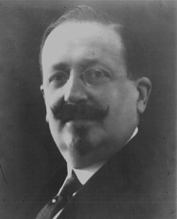| Antonio Mosconi | |
|---|---|
 | |
| Minister of Finance | |
| In office July 1928 – July 1932 | |
| Monarch | Victor Emmanuel III |
| Prime Minister | Benito Mussolini |
| Preceded by | Giuseppe Volpi |
| Succeeded by | Guido Jung |
| Personal details | |
| Born | 9 September 1886 Vicenza, Kingdom of Italy |
| Died | 12 July 1955(1955-07-12) (aged 88) |
| Alma mater | University of Padua |
Antonio Mosconi (9 September 1866 – 12 July 1955) was an Italian businessman and politician who held various political and government posts, including the finance minister between July 1928 and July 1932.
Biography
Hailed from a family based in Vicenza Mosconi was born on 9 September 1886. He received a law degree from the University of Padua in 1908.
In 1911, he was named the secretary of the ministry of the interior. He was appointed municipal commissioner in Trieste in July 1919. When the military authority in Trieste was converted into a civil authority which was named as the provincial civilian government in July 1919, Mosconi headed it after Augusto Ciuffelli. Mosconi's term in this post began in December 1919.
From 1920, Mosconi was a member of the Italian Senate and the councillor of state. He was appointed minister of finance to the Mussolini's cabinet in July 1928 replacing Giuseppe Volpi in the post. In July 1932, Mosconi resigned from the office, and Guido Jung replaced him as finance minister. In the period 1932–1934, he headed the National Bank of Agriculture. The other posts of Mosconi included the head of the Central Tax Commission (1939–1944) and of the Olympic Academy of Vicenza (1936–1944). He died on 12 July 1955.
References
- ^ R. J. B. Bosworth (2012). Mussolini and the Eclipse of Italian Fascism. From Dictatorship to Populism. New Haven, CT; London: Yale University Press. p. 99. ISBN 978-0-300-23272-1.
- ^ "Mosconi, Antonio" (in Italian). Italian Senate. Archived from the original on 8 December 2021. Retrieved 8 December 2021.
- ^ Maura Hametz (December 2001). "The carabinieri stood by: The Italian state and the "slavic threat" in Trieste, 1919‐1922". Nationalities Papers. 29 (4): 562. doi:10.1080/00905990120102093.
- Marco Bresciani (2021). "The Battle for Post-Habsburg Trieste/Trst: State Transition, Social Unrest, and Political Radicalism (1918–23)". Austrian History Yearbook. 52: 189. doi:10.1017/S0067237821000011. hdl:2158/1249629.
- ^ Eloise Ellery (August 1928). "Mussolini's Plea for Higher Wages". Current History. 28 (5): 871. JSTOR 45338858.
- Paul H. Lewis (2002). Latin Fascist Elites: The Mussolini, Franco, and Salazar Regimes. Westport, CT; London: Praeger. pp. 39–40. ISBN 978-0-313-01334-8.
External links
 Media related to Antonio Mosconi at Wikimedia Commons
Media related to Antonio Mosconi at Wikimedia Commons
| Members of the Mussolini Cabinet | ||
|---|---|---|
| Head of government and duce of Fascism |  | |
| Minister of Aeronautics (since 1925) | ||
| Minister of Foreign Affairs | ||
| Minister of Agriculture (abolished in 1923) | ||
| Minister of Agriculture and Forestry (since 1929) | ||
| Minister of the Colonies (abolished in 1937) | ||
| Minister of Italian Africa (since 1937) | ||
| Minister of Communications (since 1924) | ||
| Minister of Corporations (since 1926) | ||
| Ministry of Popular Culture (since 1937) | ||
| Minister of the Interior | ||
| Minister of Domestic Economy | ||
| Minister of Domestic Education | ||
| Minister of Finance | ||
| Minister of Justice and Affairs of Religion | ||
| Minister of Industry and Commerce | ||
| Minister of Public Works | ||
| Minister of War | ||
| Minister of Labour and Social Security | ||
| Minister of Posts and Telegraphs | ||
| Minister of War Production (since 6 February 1943) | ||
| Minister of Public Education | ||
| Minister of Trades and Currencies | ||
| Minister of Press and Propaganda | ||
| Minister of Freed Territories from Enemies (abolished on 5 February 1923) | ||
| Minister of Treasure (merged into Ministry of Finance on 31 December 1922) | ||